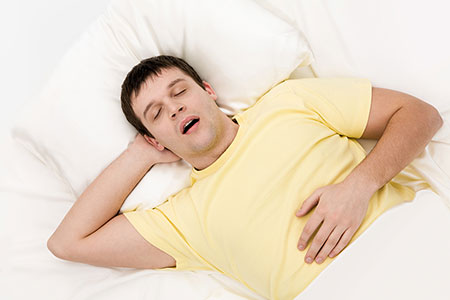
Sleeping with your mouth open might seem harmless, but it can have negative effects. This habit is common, often resulting from nasal congestion, allergies, or anatomical factors like a deviated septum.
Why Do Some People Sleep with Their Mouth Open?
Several factors can lead to mouth breathing during sleep:
- Nasal Blockage: Allergies, colds, or sinus issues make it difficult to breathe through the nose.
- Anatomical Issues: Conditions like a deviated septum or enlarged tonsils can obstruct nasal airflow.
- Sleep Apnea: Obstructive sleep apnea often causes mouth breathing as the body compensates for airway blockages.
Effects of Sleeping with Your Mouth Open
Dry Mouth and Throat
Breathing through your mouth dries out saliva, leading to discomfort, bad breath, and increased risk of cavities. Saliva is needed for washing away bacteria and maintaining oral health.
Poor Oral Health
Prolonged mouth breathing can increase the risk of tooth decay, gum disease and sometimes even oral infections. A lack of constant moisture in the mouth allows bacteria to thrive.
Disturbed Sleep Quality
Mouth breathing can cause snoring and interrupted sleep patterns. This is particularly common in people with sleep apnea, where airflow is repeatedly blocked during the night.
Dehydration
Waking up parched is a common side effect of mouth breathing. This can lead to fatigue and headaches due to inadequate hydration overnight.
Impact on Facial Development (in Children)
Chronic mouth breathing in children in the early stages can lead to changes in facial structure, including longer faces, narrower jaws, and misaligned teeth. This is often referred to as “adenoid facies.”
Potential for More Serious Health Issues
Long-term mouth breathing can strain the respiratory system, potentially leading to higher risks of respiratory infections and reduced oxygen levels in the blood.
How to Address Mouth Breathing During Sleep
Treat Underlying Causes
Use over-the-counter saline sprays or decongestants for allergies or nasal congestion. Consider consulting an ENT specialist if anatomical issues like a deviated septum are suspected.
Stay Hydrated
Drinking lots of of water throughout the day helps keep your nasal passages and throat moist.
Use a Humidifier
Adding moisture to the air in your bedroom can alleviate dryness and make breathing easier.
Practice Nasal Breathing During the Day
Training yourself to breathe through your nose during waking hours can help your body adopt the habit at night.
Oral Appliances and Chin Straps
Devices designed to keep the mouth closed can encourage nasal breathing. Consult a dentist or sleep specialist for recommendations.
Lifestyle Changes
Maintain a healthy weight to help reduce the risk of sleep apnea. Avoid smoking since it irritates airways and contributes to congestion.
See a Professional
If you suspect sleep apnea or chronic mouth breathing, visit a sleep clinic or dentist specializing in airway health for a thorough evaluation.
Sleeping with your mouth open may seem trivial, but its effects on your health can be significant. Don’t hesitate to see your dental if you suspect underlying issues, contact us today!
